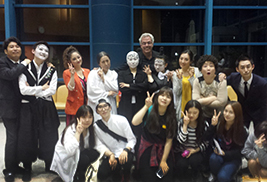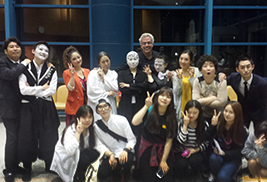Featured Article
Kent State Professor Directs Children of Eden at South Korean University
Students and the community in Busan, South Korea, proved that a passion for theatre and the arts is worldwide.
read moreKent State Professor Directs Children of Eden at South Korean University
Posted Feb. 23, 2015 | Jeff Karman (with Eric van Baars)
Eric van Baars, (center, back row), acting director of Kent
State University’s School of Theatre and Dance, poses for
a photo with his students from Dongseo University in South
Korea.
The musical offers good roles for women, as well as the availability to be interpreted by a production or a culture. He wanted the school to interpret a new production, not re-present a familiarity.
“My goal was to allow the students the challenges of creation,” van Baars says. "It is harder to make the unfamiliar known, and so I wanted to provide that challenge. And since the musical was performed in Korean and needed to be translated, it was necessary for me to bring a composition that I knew very well and trusted.”
For van Baars, teaching and directing of Korean musical theatre students in Korean was as much a learning experience as he hoped it would be for the students.
“When I arrived in Busan, it was obvious I had to ‘sell’ Children of Eden to the students,” he says. “They politely made it clear they had wanted to do Legally Blonde or Mamma Mia. Something fun! Of course, by the end of the run, many students had changed their opinion of the show.”
Comparing U.S. and Korean Theatre Programs
Just like here in the U.S., the students did not want to do the show because they did not know it. In musical theatre, familiarity breeds content, and research is the only way to stay relevant in the discipline. Once classes and rehearsals started, further comparisons between Korean and U.S. theatre education became more obvious.
“I was reminded of how similar we all are in the theatre and in education,” van Baars says. “A sophomore Korean student presents the same joys and challenges that a sophomore American student does. Senioritis is a worldwide phenomenon. I believe the theatre draws unique and specific personalities.
“I was always reaffirmed with the familiarity of theatre practitioners in a new and different culture,” he continues. “For instance, the technical director reminded me of many technical directors I have worked with in the U.S. Actors are actors. Students are students. There is a universal sameness in the way theatre folks relate to each other, which crosses over cultural boundaries.”
While the structure of higher education for theatre and performing arts at Dongseo University was very similar in the U.S., there were a couple of relevant differences. Just as is the case at Kent State, many long hours of rehearsals go into creating a production. The Korean spring semester began March 3. The students auditioned the following week and started rehearsal by mid-March. The production ran in June, so the two-month rehearsal period was a little longer than is typical of a Kent State production. However, the additional time was necessary because all of van Baars’ directions and notes had to go through a student interpreter. Although a few students spoke English, many did not.
“I was frantically learning as much Korean as possible,” van Baars says. “By tech week, I had picked up enough to direct without the wonderful interpreter. Body language is a crucial teaching tool!”
The time also was needed because students who were cast also designed and constructed costumes and scenery for the production, as well as did all their own marketing and publicity. Productions are considered a capstone experience, so along with performance opportunities, senior musical theatre students took on major roles in designing and marketing the show. This is different from Kent State (and most U.S. university theatre programs) because we have a M.F. A. and B.F.A design technical program, van Baars says.
“The students at Dongseo University worked diligently to perform a fantastic show, sometimes working 16 hours a day to prepare for opening night,” van Baars says. “Most Korean undergraduate programs are more inclusive and students gain extensive experiences in all aspects of production, often without a dedicated faculty member overseeing their work.”
Producing a Play Without a Stage Manager

Eric van Baars, acting director of Kent
State's School of Theatre and Dance,
shares his experience directing a play
with South Korean students.
Another key difference was that Dongseo University, as is the case with most Korean universities, does not have a stage management program nor does it make use of a stage manager in the same way the American production system does. In the U.S., stage managers are crucial as they ensure that the production runs smoothly, keeping track of all and calling the important cues. The cues can range from character entrances to sound bites to scenery movements or any other important cue that occurs during a show. The Korean system shares this responsibility with all technicians, learning the cues and being responsible for making their own calls. The lack of a stage manager allowed for the students at Dongseo University to learn every aspect of producing and performing a show. Living in Busan was not a huge cultural shift for van Baars, but working without a stage manager was frightening.
“Ultimately, I trusted and understood the system,” he says.
Korean institutions do not train stage managers because the job market is virtually nonexistent. In Korea, many technicians work on a production and share the responsibility assigned to one person in the U.S.
Healing Through Theatre
The South Korean ferry disaster of April 2014 placed the nation in mourning for several weeks. Many cultural celebrations were either cancelled or postponed, and the university administration considered postponing the musical. However, the message and tone of Children of Eden triumphed the timing, something Mamma Mia would not have been able to accomplish.
A country was in mourning for the loss of 364 high school students, and the show presented an opportunity for the Dongseo students and the Busan community to unite and work through a difficult time. The students’ hard work was worthwhile because the community wholeheartedly supported the show. Community members filled the seats despite the ferry disaster lurking in their minds. The message of forgiveness and healing, so eloquently threaded in the musical, allowed a communal experience for members onstage, backstage and in the audience.
The real power of theatre lies in its ability to transform. All students who had originally been resistant to a musical adaptation of the Bible understood the powerful message: creating a production creates a community.
One student who was the most resistant to Children of Eden sobbed on closing night and confessed the experience had changed her life. For van Baars, this moment was one of the most memorable as it represents the ability to transform as the universal power of theatre.
Opportunities for studying abroad are not only phenomenal learning experiences for students, but for instructors as well. During his time as an instructor at Dongseo University, van Baars learned a new culture and made lifelong memories. The cultural adjustment was easy for him because of how welcoming the students and the community were in Busan. He learned many life lessons during his time at Dongseo University, but most importantly, he was reminded of universal affirmations, “people are people no matter where you are, and never underestimate the power of a good story.”
To learn more about van Baars’ experiences in Korea, check out his blog at
www.ericvanbaars.com/evb-in-korea.
For more information about Kent State's School of Theatre and Dance, visit www.kent.edu/theatredance.
